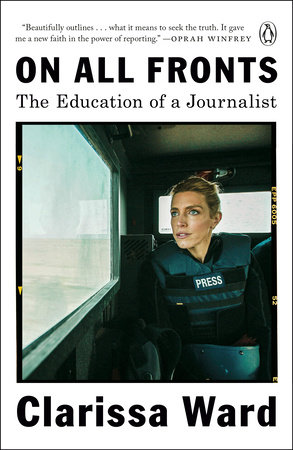
Timeless Reads
Clarissa Ward’s On All Fronts is a riveting memoir of courage and conscience, chronicling her journey through war-torn Muslim countries where reporting truth often meant risking her life. A powerful portrait of empathy amid chaos, the book reveals the challenges of being a woman journalist in deeply conservative societies and the moral strength it takes to tell stories that matter.
By Newswriters Editorial Desk
In On All Fronts: The Education of a Journalist, CNN’s chief international correspondent Clarissa Ward delivers a gripping, deeply personal memoir of her life spent covering war zones across the Middle East, South Asia, and beyond. But beyond the bullets and battlefields, Ward’s story is equally a profound reflection on the invisible front lines — the cultural, religious, and gendered barriers she had to navigate while reporting from Muslim-majority countries.
From Syria and Iraq to Afghanistan and Yemen, Ward’s reporting has taken her into the heart of conflict — places where journalism is not just a profession, but a perilous act of courage. What stands out most in her memoir is how she humanizes the people behind the headlines, especially in societies often portrayed through the prism of violence and extremism. Her empathy and sensitivity toward Muslim women, children, and ordinary citizens struggling to survive amid chaos give the book its emotional depth.
Yet, Ward is unflinchingly honest about the immense challenges she faced as a Western female journalist operating in conservative Muslim societies. She recounts moments of tension — navigating strict gender norms, dressing in abayas or hijabs for access and safety, and gaining the trust of communities wary of Western media. In one memorable section, she describes reporting undercover in rebel-held Syria, posing as a Muslim woman to evade suspicion. The constant balancing act between cultural respect and journalistic independence underscores the moral and physical tightrope she walked daily.
Ward also wrestles with the ethical complexity of being both an observer and a participant in human suffering. She questions the privilege of leaving war zones behind, the guilt of safety, and the emotional toll of chronic exposure to violence. Her encounters with women in Afghanistan and Syria — who defied extremist regimes to pursue education or tell their stories — are among the most poignant parts of the book. These women, she admits, taught her as much about courage as the wars she covered.
What makes On All Fronts stand apart from typical war memoirs is its nuanced understanding of faith and identity. Ward, who often covered Islamist movements, refuses to reduce Islam to stereotypes of extremism. Instead, she paints a complex picture of belief, resilience, and humanity in societies torn apart by geopolitics and power struggles. Her humility in learning local customs, languages (she speaks Arabic, Russian, and French), and the moral intricacies of each context lends authenticity to her reporting.
Ultimately, Ward’s memoir is not just about journalism; it is about empathy — the kind that bridges divides between “us” and “them.” It’s a reminder that truth-telling in war zones demands not only bravery but also sensitivity and respect for the cultures one seeks to portray.
On All Fronts is an inspiring testament to what it means to bear witness — as a woman, as a journalist, and as a human being — in some of the world’s most dangerous places.



